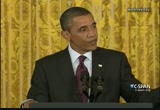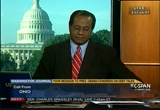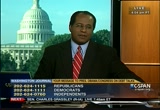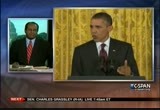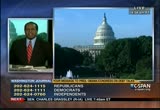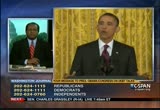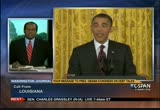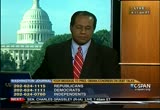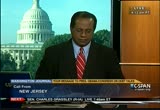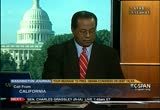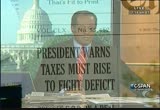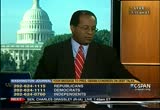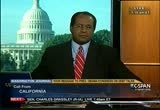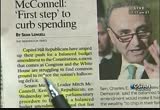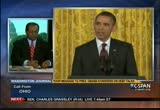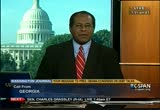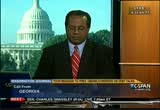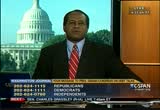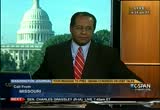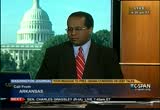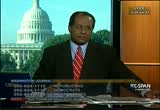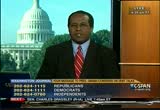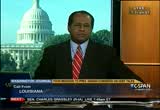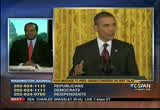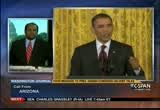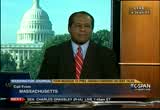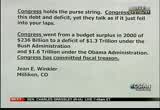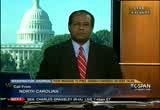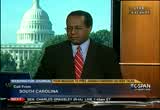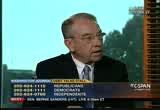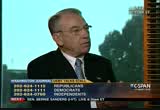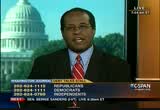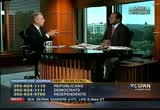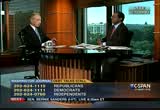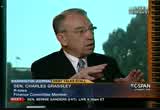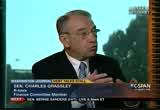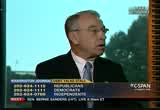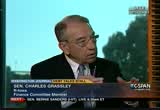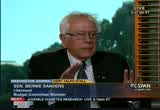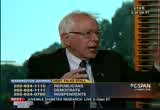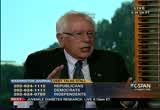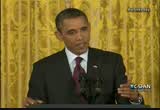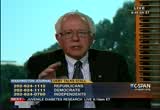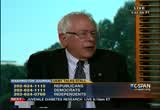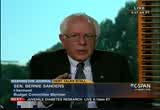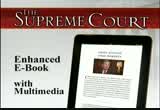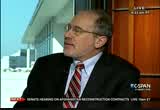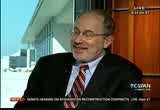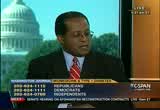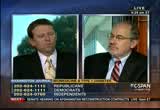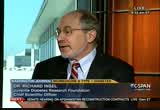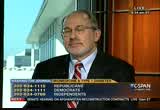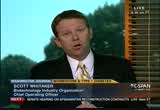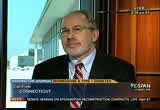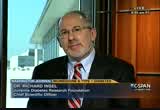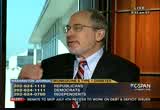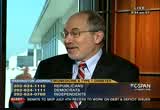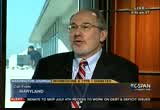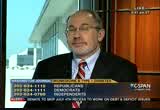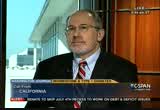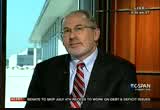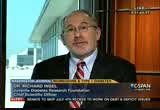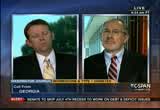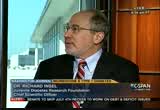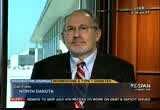tv Washington Journal CSPAN June 30, 2011 7:00am-10:00am EDT
7:00 am
gary sinise. then we'll discuss the debt limit talks.also, a discussion t juvenile diabetes research with richard insel from the juvenile diabetes research foundation and scott would occur from the biotechnology industry organization -- scott whitaker. [captioning performed by national captioning institute] [captions copyright national cable satellite corp. 2011] host: talks are heating up on capitol hill and the white house over the federal debt. what is your message to congress and the president, is the subject of our discussion for the next 45 minutes of this edition of the "washington journal." it is thursday, june 30. a debt limit election is the title of an op-ed piece in the "watch it -- "washington
7:01 am
journal." he says -- republicans say they will not raise the debt limit unless the get reductions in public sector spending without raising taxes. shall we put this to a vote? our question to you, your thoughts on a message to the president and congress on the debt talks. the numbers -- if you want to get in touch with us electronically, the addresses -- more from this morning's op-ed piece, or one of the pieces in "the wall street journal." he writes that the debt limit
7:02 am
fight is being depicted as mostly funding technicalities'. we want to also show you a little bit about what the president had to say about meeting with various members of congress. he made this statement yesterday at his news conference at the white house. >> right after we finished dealing with the government shut down, averting a government shutdown, i called the leaders here together. i said we've got to get this done. i put a vice president biden in charge with a process, that, by the way, has made real progress.
7:03 am
i met with every single caucus for an hour to an hour and that have each. republican senators, democratic senators. republican house, democratic house. i met with the leaders multiple times. as a certain point, they need to do their job. host: that is what the president had to say at his news conference at the white house. we want to hear what you have to say to the president or congress or both. our first call comes from ohio on our line for republicans. carol, you are on "washington journal." go ahead, carol. caller: democrat. host: sorry about that. caller: when i hear the republican party, for 30 years they say tax cuts would do it -- make jobs. what did these tax cuts do the
7:04 am
last 10 years? nothing. senator byrd was always saying we are your employees, you hire us. if you as an employees say to your employer i am having trouble paying my bills, i would like to have my pay cut. that is what the tax cuts mean to me. how many people out there who are employees are going to say to my employer i want you to cut my pay because i can't pay my bills. i think we need to get rid of these loopholes. we need to get rid of a lot of things, all the oil subsidies. we need to get rid of that and bring the revenue back into the coffers. host: who is your representative? caller: john gibbs. host: do you feel he is listening to you? caller: no.
7:05 am
host: the republicans only listen to one thing, and that is a the tea party. -- no. host: what is your message to the president or congress? caller: first of all, i would like to say he did a wonderful job. he explained all the points. hello? he is open-minded. he is not the guy to say it is my way or no way. he is not the president for the democrats or republicans or independents. he is president of the united states. the republicans, and some democrats, they just want to take sides. you have to work for the country and not just a particular party. i think the president laid it out, presented his case. you have a wonderful day. host: click on our line for
7:06 am
republicans in california. caller: obama says congress needs to do its job. he is tired. he is always working so hard. he did osama bin laden and he is doing the greek crisis. and congress is going on vacation. so, congress needs to step forward and lead. the debt ceiling debate -- it has been three years since the party in power produced a budget in this economy, this country. that is why we are still operating on continuing resolutions. the budget obama put forward in february was defeated by his own senate 97-0. host: what is your message to the president' if you want him to make converts half way? caller: l-e-a-d.
7:07 am
the the president, for crying out loud. then he says congress needs to do its job. let me make superfast points. president obama signed into law of the bush tax cuts in december. that was during the lame-duck. he had 59 senators at the time, a plurality of 78 in the house. why did he sign the tax cuts? what is obama's plan? he is the president, you know. host: "the financial times" this morning, this headline. they write --
7:08 am
back to the phones, and our discussion on your message to the president or congress regarding the debt talks. the next call comes from michigan on our line for democrats. james, you are on "washington journal." caller: good morning. i would not like to scare everybody, but president obama has been doing everything george bush has been doing and nobody had anything to say when bush spends all the money. now he has a big problem. the problem with america is, the older generation, which is mainly a racist, needs to die off and yet -- let the young generation move this country forward.
7:09 am
host: paul on our line for republicans in new orleans. caller: good morning. it is amazing when i listen to democrats call in how ignorant of they are. actually nothing intelligent to say. what this president has not done is exactly what the gentleman two calls has said -- he has a led. i do not think he has led anybody anywhere. he does not have the capacity to lead, because he does not know how. i do not think he could lead a girl scout troop on a camping trip. if this guy is totally close list -- clueless. the bottom line is a they are trying to rise taxes on another industry like they did during the clinton years, and what it will do is take the blue-collar workers working on the airplanes, filling the gas, and the people will supply all of the parts, and they will be out of work. the same thing that happened during clinton. two months later they had to take the ban away because so
7:10 am
many lost their jobs. host: what would you tell your member of congress on how to deal with the president? caller: look, you have to have a president that can be a leader. this guy is taking his cues from reading off of the teleprompter. he doesn't know what he is doing. he is not adding any -- if you listen to his speech yesterday, which i did -- it is very hard to get through it. there was no substantive comments. it was all about the republicans -- just childish stuff. he speaks to the ignorance, the people who don't have the capacity to see what is going on in the country, the people that are just so stupid that they listened to the rhetoric and they believe it. that is the way it is. people think that raising taxes on the rich is going to bring in revenue -- it doesn't. it never does. it goes down.
7:11 am
host: mike from georgia on the line for independents. my head is about to explode. we call social security insurance, insurance, but it is an entitlement all of a sudden. -- all of a sudden. rumsfeld on it and september 10, 2001, he said they lost a billion dollars but they borrowed $2 billion twice. we voted them out with a golden parachute. you do not give bank robbers a golden parachute. go after the people's money, the politicians that voted this garbage in and told fox accountable. host: is a debate over the debt talks, will that have an effect on how you vote in november of 2012? caller: i don't know if it matters. it seems like the whole kit and caboodle are paid for.
7:12 am
7:13 am
set up and there were things i know he didn't like and things the republicans didn't like, but he did not say this will move us in the direction, let's do it. he ignored it in his state of the union address. he is not serious. it is really sad. host: if you had a chance to sit down and talk with the president or send a message to your member of congress, how would you get the message across that this is serious? caller: i would point to greece -- and i am greek. [laughter] it is sad. host: inglewood, california, on the line for democrats. caller: how are you? host: just fine. what is your message to congress or the present? caller: interesting, the last 10 years we have had the bush tax cuts and republicans keep swearing that if you reduce the taxes on the super rich, they
7:14 am
will produce jobs, and it hasn't happened. during that same time based ship jobs overseas -- they ship jobs overseas. there is no manufacturing base. it is amazing in the midterm election, they won. democrats lost the house. the main problem then was the high unemployment. the very next day the republicans took over the house. now it is not unemployment, it is to reduce the debt. in one night, by magic, they changed the whole subject. and the democrats bought into it. now we have a debt reduction problem. no, we have an unemployment problem. host: this mornings "the new york times."
7:15 am
president warns taxes must rise to fight the deficit. says senator rand paul of kentucky says the national debt is the number one crisis facing the country. here is a little bit more. >> our country is in grave danger. is the not -- the number one threat to our country is the national debt. 14% of the public agree that congress is doing a good job, that it has been a good steward of the taxpayers' money. 75% of the public -- republicans, democrats, and independents do you believe we need a balanced budget amendment. we will not ever some of our fiscal problems until we amend the constitution. we must have a balanced budget amendment and i hope the democrats to join us. host: rand paul is our scheduled
7:16 am
guest this sunday at 10:00 a.m. and 6:00 p.m. on c-span. that's our discussion regarding your message to the president and -- back to our discussion regarding your message to the president and congress. sharon, you are on the washington journal. caller: my message is to all your southern white republicans. you had 10 years of the bush administration, you had it 10 years of his policies. you had 10 years of not only his tax cuts, the republican way. what did we get? we got a housing prices and two wars off the books -- we got the housing crisis. and we got two wars of the books. they want people to die while they profiteer off of the tax dollars. where have you been sitting, southern white republicans? how did you benefit?
7:17 am
host: ken in cincinnati, ohio. caller: i host a talk show in cincinnati. one thing i notice is we have major class warfare. my message would be to end the class warfare -- from the president on down. and you cannot raise enough taxes to pay for the wild spending. if you were to compare $1.20 trillion to $20 billion, it is like putting $20 down on a $1,200 credit card. it doesn't make sense. this is nothing more than class warfare and the man that does not end -- add up. we need a balanced budget amendment. host: regarding the balanced budget amendment, in the "washington times." constitutional amendment gets stronger push by gop.
7:18 am
warren, ohio, on our line for democrats. you are on the "washington journal." caller: one correction to the caller from california -- it is eight years. i would say, mr. president, you had a debt committee and you didn't listen. you shouldn't be on national tv demagoguing and criticizing the opposite party. it makes it harder for you to deal with them. the know, we have been told for how many years -- you know, you
7:19 am
have been told for how many years you are spending too much money. i put it on my own party. i hate to admit to it, but he had all kinds of chances to correct this. we had plenty of time. i could go on for ever. i don't have that much time. host: who was your representative? caller: are you talking about the senate's -- host: the house. caller: we have kasich -- host: i think he is the governor, is a need? caller: we have brown. host: what is your message to senator brown? caller: you can get through to him. host: he watches, what would you say to him? caller: i am a democrat and it
7:20 am
is ridiculous to hear the president talking the way he does. he has a 13-year-old, 10-year- old daughter -- how can you deal like that? he had a debt committee that he appointed himself and he did not do anything. the country is telling him not to spend so much money. host: we got this tweet -- that is the message this morning regarding our discussion on your message to the president and congress on the debt talks. knoxville, tennessee. danny on our line for independents. go ahead. caller: i would tell the president first off, historical rate -- historically, raising
7:21 am
taxes does not increase revenue. the presidential golden parachutes upon leaving office. in the real workplace, if people performed as poorly as these people have had over the last 10 years they would be fired summarily. they would not have benefits. host: in a "the wall street journal" is the headline -- brunswick, georgia, on our line for republicans. lisa, you are on "washington journal." caller: how are you doing? host: what would you tell the congress or the president?
7:22 am
caller: i would say there is no more money, and you can't raise taxes to bring in revenue -- cut the taxes, and stop the spending. the spending is out of control. there are some many places that we are pouring our money into and it is not doing any good, it is not helping the people. host: where do you think we are putting money that is not helping the american people? caller: listen really carefully when i say this -- in our town we have high poverty. a very little tax base. a lot of people are living in government housing. fine people, but they are in this system where they are taking money from the government and it is just going around and around and the kids are suffering.
7:23 am
they are not in hopes of a better life. a lot of them are just in hopes of more government spending on them. that is not living. i just think there's got to be a better way. host: you think cutting federal spending for these programs would alleviate the debt problem? caller: one of the ways. then, of course, all the furbelows things i hear about where so many people are lobbying for funds and they just lobby and lobby and they say, come spend money on this environmental project or, and spend money for this group that and needs money. money forand spend this group that needs money. there are so many things we want to spend money for as a family but we have to pick and choose.
7:24 am
host: let's move on to farmington, missouri, on our line for democrats. caller: number one, my comment goes right along with the last caller. we need to cut the spending. number one, bring our troops home. what are we over there for? oil. let's put money into resources we have here -- oil, a period. republicans never gave obama a chance. a problem with every single bill he tried to pass. go, obama, fight for it and stand up for it. where we can cut the budget? it is not the kids or the homeless or the poverty, war on drugs -- you know? let's cut it there. dea agents and all of this they have set up against methamphetamines, and all this
7:25 am
to buy a box of sudafed pills. host: a headline in "usa today." what did you think about when the president said the lawmakers need to do their jobs. caller: the lawmakers are doing their job. the senate and house need to do their job and come to an agreement so obama can get something done. lawmakers -- we live in a good community. i know not everybody does. not everything is peachy keen. lawmakers are doing their job -- it is the other side programs, the task force, going above and beyond. host: we've got this tweet from magiccart21 --
7:26 am
that is his message to the president and congress regarding the debt talks. back to the phones -- van buren, arkansas, on our line for republicans. josh, you are on "washington journal." caller: thank you for taking my call. with the topic on the debt ceiling, a couple of callers earlier -- one thing i would say to the president. if he would have kept some of the campaign promises and brought some of the troops home i am sure we would have saved quite a bit of money. and talking about how many loan sharks does our country have to go to? we are borrowing from so many people. we borrow from the fed, we borrow from china. here we are, we've got this big mess. everybody talks about this money. america, you have to start
7:27 am
figuring out about the money system. we are borrowing this money from people. that is why we have to pay it back. we are borrowing at interest. we talk about all of this and now we are talking about breaking our promises to the elderly, with our social security and medicare. we are in the position we may have to start breaking promises? this is not democrat or republican. this is a serious problem. look at our monetary system, our monitor -- monetary policy. bankers, we have to get rid of them. host: senator schumer of new york blasted representative -- the speaker, rather, by saying there are not enough house votes for any revenue increases. this is a little more on what senator schumer had to say. >> look, people on our side could say we are not making any cuts. you cannot stay in your ideological corner and keep the
7:28 am
united states of america sold and in terms of paying its debts. and so, you know, we could get up and make the comment, too. only our way. that is a formula for disaster, the kind of crisis that america will face after august 2 if we don't raise the debt ceiling. it will be one that will create trauma for millions and millions of innocent people and could set us back into recession. so, that kind of comment is not productive or helpful. if every negotiator or every liter or senator or house member said my way or no way, we are not getting anything done. host: we continue our discussion regarding your message to the president's and congress -- to the president and congress. springfield, ohio. caller: what i would like to say is i really think the president
7:29 am
is doing a great job. i think the senators are doing a lousy job. i will not pick one side or the other. they have been on his back since the beginning. this country runs on taxes. to go back to bush -- when he put those taxes in a fact i thought it was a big joke to start with, -- taxes in effect, i thought it was a big joke to start with. they need to get down there senators' throats. this country should have had insurance 40 years ago. senator saying if you put it in, it would be the ruination and you will wait and line for doctors. if we cannot put the best nationalized insurance in our country there is something wrong. host: if your senator or representative is watching this morning, what would be your
7:30 am
message? caller: they ought to start thinking about the american people. i think they ought to start thinking about all the people in ohio and not just the rich. that is my feeling. i don't think they have the right to take votes away from the people, saying they don't deserve to have these bargaining rights. i don't believe that. everybody should have a right to vote for someone to bargain for them. host: taking a look at some other items in the news as we continue our discussion regarding your message to the president and congress on the debt talks. the lead story in the "washington post."
7:31 am
back to the phones. louisiana. a georgia on our line for democrats. caller: thank you for taking my call, c-span. in order to fix the deficit -- if you get rid of all of this extra welfare people that is on there that don't need to be on there. if you actually cut the younger folks who could get there and go to work -- just because you're a kid has allergies and add, you don't need to pay for that through social security card on the other hand, get rid of a 1099 -- the 1099. given w-2 with matching social
7:32 am
7:33 am
you can read more about that in "usa today." new jersey on our line for republicans. chris, you are on "washington journal." caller: i am calling to thank our congressmen for doing a great job. thank you. host: what would you say to them about the dealing with the president regarding the deck -- debt talks? caller: i am sure they will come to a rational conclusion and do what is right for the country. host: we have another tweet -- we have another caller from ontario, canada. roger, your message to the u.s. president and congress on the debt talks?
7:34 am
what is your feeling in canada? caller: i am a dual citizen and my roots are on the democratic side of the spectrum. and i am disappointed in president obama. i feel he has no backbone when it comes to dealing with the congress. and i don't think the media this morning, from what i'd clean up here in canada and what you show on the program -- from one i glean here in canada and what you show on the program is right. him telling lawmakers to do their job. if anything, obama is letting them walk all over him. he is weak. host: let us move on to ontario, california, on our line for republicans.
7:35 am
tony, go ahead, and turn your television down, please. caller: this is steve from phoenix. i would like to say if maybe we could raise some of the taxes on the wealthy and corporations, but maybe if we throw them a bone as far as lifting some of the regulations for five years -- like, for instance, make the gas to more basic, that would make it cheaper. the other thing that would be good is to let the logging industry do their job. i am in arizona where we have all the fires. if we would let the loggers do their jobs there would not be all of this waste with all of those wood.
7:36 am
if they just raise the taxes and little bit and it raised the ceiling a little bit, i think we will get there. host: in our discussion regarding the message to -- your message, rather, to the president and congress on the debt talks we heard from ontario, california, and ontario, canada. more international weighing in on the debt debate. from "the financial times," this headline -- croft and, maryland, on our line for democrats -- crofton,
7:37 am
maryland. caller: good morning, america. just on the news yesterday, first of all, they gave -- there was a poll that says about 28% of the country believes bush is still the most responsible for the debt, and then it was wall street that came in second and congress came in third and i think the figure was 8% for obama. i just want to congratulate obama. first, he got himself elected and the second thing is he brought some honor back into the fight. he kept his promise. the iraq war, we are winding down. we don't have anybody there. that was the worst war in american history. host: president bush is no longer in the white house. it is president obama and the congress right over there behind me. what is your message to them?
7:38 am
either one -- republicans, democrats, the president? caller: absolutely. i appreciate the question. when bush was in there and the senate was running, 50 votes got something through the senate. ever since obama has been there, president obama, 51 votes does not carry anything. host: in "the washington post" this morning -- this is them writing about the attack on the intercontinental hotel in kabul.
7:39 am
back to the phones. massachusetts on outline for independents. what is your prep -- message to the president or congress? caller: he needs to start playing hardball. tell the republicans he is drawing a line in the sand. they need to greet to -- agreed to revenue enhancements. host: what would you consider revenue enhancements? caller: i watched a bernie sanders on one of your programs. one of the things is all of the corporations that are headquartered in the bahamas. i think there were something
7:40 am
like 18,000 corporations headquartered in the bahamas. make them register at home and get taxes on these people. get revenue enhancements. second, i would say to the republicans you have to stop your mindless support of the rich and the corporate eats. listen, again in the program with bernie standards -- bernie sanders, there were $4 trillion of revenue enhancements. these republicans have to get off the dime and get to work. host: fred in massachusetts. we want to remind our viewers and listeners that in a few minutes we will talk to senator charles grassley of iowa and then we will talk to senator bernie sanders of vermont. massachusetts on our line for republicans. caller: they keep talking about corporate welfare -- but don't the people know that
7:41 am
corporations pay the highest taxes in the world, 35%, and some states have as much as 10%, that is 45% corporate tax. you cannot tax anymore. companies are leaving -- the person just said. they are going to the islands, they are going overseas. and as far as income taxes are concerned, the lower 50% of people don't pay any income taxes. so, you cannot tax more. you are driving business away. any questions? host: we will leave it there. we've got this e-mail from colorado --
7:42 am
greensboro, north carolina, on our line for democrats. caller: i think what is happening is that the republicans decided they are not going to cooperate with the debt ceiling because they really want of the country to fail. in essence, they want president obama to fail. that is what they said all along. all of these suggestions, they are against them. the president has said not just for tax increases but he also called for cuts and he said he would cut some of the programs that the democratic base holds dearly. but he also needed a revenue increase. but republicans have said, no, they would not do any type of
7:43 am
revenue increase. the debt ceiling vote, from what i understand, is a vote to pay for the bills that have already incurred. like you have a credit card and you already made these bills that you need to pay the card off. that is my understanding. it is not to increase any bills. it is the that we need to not -- we are not paying the bills we already incurred and that would create a tremendous problem in the united states and probably affect the world. host: phil on the line for independents. caller: how are you? host: just fine. caller: one simple thing -- we do not have a republican problem or a democrat problem. what we have is a politician problem. was it -- we need term limits so these people can't be in there worrying about being reelected
7:44 am
but worry about what is right for the country. i tried to get a hold of dorgan yesterday -- all they care about is doing what is good for them. until we get to a situation where they are not concerned about reelection, we are never going to fix it and they would just point fingers back and forth. host: in "usa today" this morning, their lead editorial --
7:45 am
we want to remind our listeners and viewers that the pentagon farewell ceremony for outgoing secretary gates will be live on c-span 3 beginning at 9:45 a.m. the armed forces will bid farewell to his secretary gates. president obama will be one of the speakers. live on c-span 3 at 9:45 a.m. louisiana on our line for republicans. caller: i would like to say thank you to the conservative members of congress. were it not for them, this budget would be hundreds and hundreds of trillions of dollars. these people that are in the administration now, the only thing they know how to do is spend, spend, spend.
7:46 am
stop. point we have to our grandchildren will pay for this, and it is going to be bad. it is going to be like greece is now except 100 times worse. host: newport beach, california. michael on our line for democrats. caller: how are you? host: michael, what is your message to the president and/or congress. caller: fast message -- this is a debt ceiling will 100% be increased the last week in july. 100% democrats and republicans will come together after all these months and increase the debt ceiling. if anybody watches my e-mail -- i bet $10,000 to $1 it will be increased.
7:47 am
host: coming up this morning, a discussion with senator bernie sanders of vermont. later, a look at diabetes. but coming up after this break, a discussion on the stalled debt talks with senator chuck grassley, republican of iowa. you are watching "washington journal." today is thursday, june 30. we will be right back. [captioning performed by national captioning institute] [captions copyright national cable satellite corp. 2011] >> to an end to c-span this independence day. -- tune into c-span this independence day. >> had a political level we are more divided, if you look at party polarization, since the civil war. >> and a talk about religion, violence, and the death penalty. later, nixon white house insiders discuss his foreign- policy. monday, july 4, beginning at
7:48 am
10:00 a.m. eastern. for a complete schedule go to c- span.org. >> this fourth of july 3-day weekend, on american history tv on c-span 3, we will visit the smithsonian museum of met -- natural history, an expedition to circumnavigate the globe, and 40 tons of specimens that became the foundation of the smithsonian institution. former first lady laura bush on her time at the white house, planning the presidential library, and her memoir. and then a panel including former clinton press secretary discusses jfk's relationship with the press. get the complete schedule at c- span.org/history. >> i have huge trust in the united states of america. i read my alex de tocqueville over and over. [laughter]
7:49 am
and i have huge faith in democracy and the democratic process. >> learn more about france's christine lagarde, the new head of the international monetary fund, on line. she is one of the 15,000 people you can search, watch, clip, and share. watch what you want, when you want. >> every saturday in july, here historic supreme court oral arguments on c-span radio -- about 14th amendment cases on equal protection, including sexual orientation. this saturday, single-sex admissions policies in the case of mississippi university women versus hogan. nationwide on xm satellite channel 119 and online at c- spanradio.org. >> "washington journal" continues.
7:50 am
host: senator chuck grassley, republican from iowa and member of the finance committee joins us to talk about the stalled out debt talks. yesterday morning in politico there was an article with the headline -- gop strategy on debt talks not on the level, said the president on wednesday. he lashed out at leaders for stalling over negotiations over a long term deficit reduction and avoiding hard but obvious choices about raising revenues. your response was montego i find the president easy to get along with when there is a lot -- your response. guest: i find the president easy to get along with when there is a lot of pageantry, but when it comes to the hard work i don't see him sitting down with people to really get the work done. he is flying all over the country and making speeches all over and starting his campaign already. if he put as much time in helping get a bipartisan agreement on debt reduction and on everything else connected
7:51 am
with the economy, i think the time would be better spent. so, i accept what he wants to do, but it would be better if he had been at the table maybe two months ago instead of having biden. host: yesterday he talked about tax deductions for welcome it -- he talked about that tax deductions for wealthy americans have to be on the table. >> i want to be clear about what we are proposing. i spent the last two years cutting taxes for ordinary americans. and i want to extend those middle-class tax cuts. the tax-cut i am proposing we get rid of our tax breaks for millionaires and billionaires, tax breaks for oil companies and hedge fund managers in the corporate jet owners -- and corporate jet owners. guest: first of all, i would
7:52 am
suggest he ought to read professor -- of ohio who studied raising taxes and what it does to the budget. he studied it sense of what war ii. he s did -- he he since -- he studied it since world war ii. he says when congress is raise $1 it is an incentive to spend $1.15. it is making the deficit worse instead of better. we have an overspending problem in washington. we don't have a problem that anybody is under taxed, and i say that with great sincerity because for 50 years the average x federal government was 18.2% of gross national product. and spending during that period of time was about 19% or 20%. now you have spending up to 25%. it is that difference, or the
7:53 am
desire to have government consumes so much more, that is the problem today. for instance, over the last two years we increased expenditures 22%. that is on top of the $814 billion deficit that didn't keep unemployment under 8% like the president said it would. you just can't increase expenditures 22% when you only have 2% growth in the economy. it is the spending side of the ledger that is the problem. i will not argue with the president that certain loopholes ought to be closed. but if you look at corporate loopholes, it ought to be done in the context of reform of corporate taxation. because you had a previous caller, as i listened, who said we are the second highest -- we might be the highest corporate tax in the entire world. we ought to reduce the corporate tax. we ought to close loopholes. but it ought to be done in the
7:54 am
context of corporate tax reform because of the globalization of the economy. also the same thing on income tax. we've got an atrocious tax code. those of us on the finance committee have even made it somewhat worse and more complicated. we ought to throw it out and start over again and do tax policy as a tax policy, but not do what the president said -- do some taxes now so we can spend more because the problem is not under taxation, the problem is overspending. host: we are talking to senator chuck grassley, republican of iowa and member of the finance committee. the numbers are on your screen -- you can also send us messages via email and twitter. our first call comes from morehead city, north carolina.
7:55 am
georgia on our line for democrats. caller: good morning. host: go ahead, georgia. caller: i am on the line. good morning. i would like to say that the mess we are in right now is being blamed on the president obama when we had all those years of president bush and clinton messing up the budget and president obama is getting blamed for it. he gets blamed for everything. what i want to say is i thoroughly agree with taxing the rich people. i thought that for years. i am on social security. if you tax the social security and medicare, i have a feeling nobody needs to run for dog catcher if they run again. host: what is your definition of rich? caller: millions. host: millionaires. guest: i will agree with the
7:56 am
caller but i want to add to something she said. i agree with the caller that president obama inherited a terrible mess from the previous administration. but it doesn't matter if you look at unemployment or the budget deficit or the price of gasoline -- all of these things have gotten tremendously worst under president obama. so, no doubt, she is right, it wasn't good when he took office. but there isn't a statistic that you might point out that president bush where he was on things that it is worse now. very much worse. host: our next call comes from tennessee on our line for republicans. caller: thank you for taking my call. senator grassley, i appreciate you. i watch you all the time and you have good common sense. what i believe in life is simple -- we will not get ourselves out of this thing until everybody pays their fair share. 40% of american people don't pay
7:57 am
a dime in taxes. i propose a 3% sales tax for 10 years. along with that from a stipulation that for every $1 we collect, $4 in budget cuts. so we cut the things as well. that is what i would think would help us. but you cannot have just 60% of the american people paying all the bills. you have to bring some revenues in, and at the same time you have to cut spending. i was a businessman and my business went under. i went from 130,000 a year down to 30,000. i had to do things i did not want to do and i titan's my belt. -- tightened my belt. guest: a sensible approach -- raising taxes would go to the bottom line. but i referred to the professor it again -- and dollars worth of taxes is a license to spend
7:58 am
$1.17. we have had taxes coming in 50 years, 8.2% of gross national product. that is a level of taxation you don't have to revolt against. history proves that as a fair amount for the pro-government to take a leave the 82% for you to spend. -- that is a fair amount for the government to take, and leave the the 82% for you to spend. we have to bring the level of expenditure back to where it was for the historical average. that is why i keep saying congress is overspending. you can't have of the 22% increase. one of the things i would do to help solve the situation, i would preempt the 22% increase, go back to the 2008 levels of expenditure and i would freeze it for five years. that is just on discretionary -- only 15% of the budget.
7:59 am
if you really want to solve the deficit problem you've got to look at entitlements, 45% of the budget. we've got to save social security, we've got to save medicare. the trustees give an annual report. and down the road we know these programs are going to go under if we don't do something. i can say medicare will go under -- social security will not really go under but instead of paying 100% of benefits, by 2036 we will pay 75% because that is the cash flow. you cannot pay more than going out after use the assets. we use of the assets, the interest. i don't want someone who is drawing social security say to me today, just leave social security alone and it will take care of itself. it will not take care of itself at 100% of benefits. if you are satisfied with 75%,
8:00 am
you can leave it alone. but i have a responsibility to make sure my grandchildren have the same social security that i had and they have the same medicare i would have if i were in retirement. host: robert from tennessee on our line for independents. caller: senator grassley, i really respect you. i have watched you for years. i think you are a very intelligent guy. and i will tell you something a little shocking -- the guy coming on after you, bernie sanders, i also agree with him. it couple of things you can do is means testing for social security. i am disabled and drawing disability benefits to. i understand this a little did more than the average bear. a person that is drawing, or has a net worth of $5 million, as an
8:01 am
example, or more, that draws a social security if check if -- that should be eliminated. warren buffett made that 0.18 months ago and everybody said it was a bad idea donald trump mentioned something that i thought was interesting when he was playing around with running for president. he said why are we spending billions and billions of dollars for bases in south korea, japan, and the philippines, and around the world, in cases that do not need to be opened? if you want to pull those people out of there, to discharge them from the army, if they want to be out, otherwise they could be doing work other than what they are doing there, and you and i both know it costs billions and billions of dollars to keep each one of these bases open. in addition to that, when she
8:02 am
starred that line of thinking, -- once you start that line of thinking, they are making products, they can pay for protection. host: we will leave it there. guest: i would agree that we have to many bases overseas. where we have treaty obligations, we are going to have to maintain those treaty obligations, like with nato or south korea, or else you have to go to the process of getting out of trees. to what extent do you lose your credibility? there is one thing bernie sanders and i agree on and work together on is that the federal reserve should be audited. the federal reserve as part of our government. it should not have -- it ought to have more transparency, and with transparency comes
8:03 am
accountability. i would say one last thing about means testing. we probably will have to means test social security more. i want to emphasize the word "more." maybe the caller does not recognize that social security is means tested it indirectly now through higher-income people putting in a percentage of social security to be taxed a second time. the other way it is being tested is if you are higher income, you probably get about 22% of what your last paycheck was, as opposed to lower income people getting about 44.5% of their last pay check before they retired. so, in to do well begin to be will ways it is means tested -- so, in two ways it is means tested.
8:04 am
host: we have this from twitter. guest: we have a lot of policy in that area already. i agree with that. we have kind of adopted the policy throughout 200 years of our history that one way or another, people that are destitute, people that cannot help themselves, people then need a little push to get along, to hopefully with them into self-sufficiency -- there has always been some sort of government programs to do that, whether it was during the revolutionary war and the houses of poverty, or whether it is now, with welfare. why why i resent, and getting back -- what i resent, and getting back into what the president is talking about, attacks in higher income people, you could have a
8:05 am
situation -- let's take the state tax. i'm an advocate for doing away with the estate tax. two people have made $1 million each. somebody is very conservative. this other person drank it up, and gambled away, everything else, they make the same amount of money, but somehow this person does not have anything to lead to his kids. this one does. you have that treatment that is not equal. there is no way the tax code can recognize what the common sense e-mail indicates. i guess we have to live with it. host: in "in new york times" earlier this week they had an editorial that said serious negotiations require a serious negotiator. they write that --
8:06 am
8:07 am
subsidies, tax policies, ought to be considered one of two ways. either when you are revising corporate tax policy, or, in the case of oil companies, i would say it is better to do it when you have energy policy. if we have four things we have to do for energy independence. drill here, drove the ball, and encourage production of oil -- drill here, drill now, and encourage the production of oil. all of those have subsidies. we ought to consider those subsidies within energy policy is so you have a level playing field with all of the things you want to accomplish to be more independent. that is another thing we could do to create jobs in this country, instead of spending $835 billion -- i said that wrong, $835 million every day to import oil, there is no reason
8:08 am
we should not be drilling here, and drilling now, using all of our sources of oil cost of alternative energy, and we need a level playing field for all those different sources. if there are subsidies, they ought to be somewhat equal. host: we're talking about the stock of debt talks with senator chuck grassley, a republican from iowa. our next call comes from misery. nancy, on our line for republicans. caller: senator grassley, i think we should go back to the balanced budget era we had during the reagan era. i believe social security needs to be revised, and i am a baby boomer -- i would like to see social security revised so that it is there for everyone in the future. also, my brother is a small businessman, and he is not able
8:09 am
to get loans because of all the requirements that the banks have to loan money. i would like to see that change also. thank you. guest: i think i can answer all of her questions except small business. there, you have a situation where banks as well as small business, they didn't know what the future holds. -- they do not know what the future holds. if there is this health care reform bill but has to be implemented. there is a question of taxes going higher at the end of 2012. there is all of this regulation writing that is going on in the said administration. all of this leads to uncertainty. -- in this administration. all of this leads to uncertainty. asked if we had more certainty, stopped writing regulations, telling people we are not going to increase taxes at the end of
8:10 am
2012, that we will drill here, drill now, and have cheaper energy -- all of those things would lose some of the banks and the corporations that have trillion in reserve that could hire people, but they do not want to hire people because they do not know what government will jim them with in their rear end tomorrow. people are being cautious. i think we would have small- business lending by banks and small business and corporations would spend. social security, i've already talked about, so the last thing would be the balanced budget amendment, and nancy is right. about 20 years ago, it was up for a vote, and came up one vote short term and the one republican that did not vote for
8:11 am
it made a difference, otherwise we would have a balanced budget amendment to the constitution right now. it will come up on july 18 for a week-long debate, and all 47 republicans are signed up. we have a lease 20 democrats that vote for it, and if we do, it will be on its road to having the same requirements as the states have. it would be good discipline. it is not a point to help with the immediate problems -- that has to be cut, cut, cut right now, but when we get out of this whole, the balanced budget amendment requirement would help the state more fiscally sound. host: our next call comes from baltimore, maryland on our line for democrats. robert, you are on "washington journal."
8:12 am
caller: it is roberta, and i am glad to be on. three questions. to all of the big farms owned by japan -- -- do all of the big farms owned by japan and china -- are they going to get the farm taxes? another thing -- why could we not do as your president reagan did and start the program to get -- to teach kids and other people how to work, what to do when they go to work? during that progress on our roads got a lot better. did you know, sir, that general electric paid no taxes? all of these companies that your outstanding for paid no taxes. they have 40 lawyers making sure
8:13 am
of of the taxes -- making sure about the taxes. if they have done nothing lot of people with the big money pitch in, too. guest: i did not understand the farm texas. did you know what she was talking about? host: i think so. let me talk about an editorial in "the usa today." they have 10 terrible tax breaks. they write ethanol, the fuel made from corn, does not come close to compete with traditional gasoline on price.
8:14 am
host: add to that -- a question from oswego, new york. guest: in regard to the ethanol, -- two reasons, i think forces fought -- for farm subsidy programs, and i am an advocate that we should not be paying big farmers to get bigger. i have always been a sponsor of what you call a hard cap. i think it is silly for some farmers to get millions of dollars. 10% of the biggest farmers get 70% of the farm program. i want to be intellectually honest with you. i am a farmer. i get some benefit from the farm program. 10% of the biggest farmers get
8:15 am
70% of the benefits. the farm program needs to be targeted. small or medium-sized farmers, -- targeted to small or medium- sized farmers, so we need a cap, and it is difficult to get support for that in the south. i have not been successful, but i will try again. the old saying that we are only nine meals away from a revolution -- social cohesion, social stability -- you do not want food riots but they have in some countries. protecting the family farmer, and i am not talking about the mega-farmer, he wants to make sure that when you have a natural disaster -- you want to make sure when you have natural disasters -- look at the politics that defects farm prices. when carter puts a grain embargo on, or ford, prices go down or,
8:16 am
let's say a natural disaster -- you can not use the mississippi river to get your dream out for exports, and the price drops 25 cents in one day. that is not the farmer's fault. so, the safety net is to protect the farmer against things that are beyond his control because he does not control the weather, washington, international politics, or whether there is war. to have something happen in israel this morning to a defect farm prices? the other reason is for national security. the germans and japanese protect farmers because they found dog when you start during world war two you cannot efficiently -- found out when you started during world war two, you can
8:17 am
not have national security. that is another one. 3% of the coarse grain worldwide goes into biofuels. so anybody that says we are taking food out of the mobs of people because we make ethanol out of it, -- 10% of all of the fuel burned in cars as from ethanol, and that is equal to what we import from venezuela, or saudi arabia. did people think we should ought to do away with 10% that comes from renewable fuels, domestically-produced fuel costs, and rely on people that hate us, or send more money to saudi arabia saw the train terrorists to tell us? i did not think that is good national policy. we ought to be praising people that want to domestically produced energy. if you wonder whether or not we
8:18 am
should have held for ethanol, which will end right now, a feat end of this year, you have -- and which will end at the end of this year, you have to ask should get more oil. i think we want domestically- produced, renewable fuel. we would not have a biofuel industry if there had not been held from the government. now, it ought to be done away with. host: we have tom online from baltimore, maryland, on our line for republicans. caller: 5 been a strong supporter of the republican party for over 30 years. i want to know why the republicans -- i'm a strong supporter -- but it seems to me they had changed their menu. they do not want to compromise,
8:19 am
and they're fighting this oil tax. it does not make sense to me when you have oil companies making these billions of dollars, and they will try to take it out on the poor person. they got their medicare and medicaid your john boehner say this is what the people want. it is not what the people want. it is with the big businesses want. i am a strong supporter of the republican party, but i'm seriously thinking of switching over to the democrats. in guest: if you're going to change tax policy for corporations, do it in the context of revising the second highest corporate tax rate in the world, so we could be more competitive with our international competition. do not until in the context of raising more money so that covers -- do not do it in the context of raising more money so that congress spends more.
8:20 am
he talked about medicare. republicans want to save medicare. it is part of the social fabric of america. it is not just a government program. he is a government program, but you have to remember, when people retire from john deere in prior -- iowa, they get health care paid for by the corporation. after they become 65, medicare is dovetailed in with their corporate health retirement plan, and their john deere plan becomes a supplement to medicare. it is not only to save it because it is department program, it is part of the social fabric of america. republicans want to save it. the fact is, if we do nothing like a lot of people are saying, just do not touch medicare, we know by 2021 based upon what the trustees say, not what i say,
8:21 am
there will not be in medicare program. the trust fund will be broke. it is like saying, 21, we're not willing to have any. you have to do something. host: your thoughts on the medicare proposal put forward by your colleagues, senator lieberman, and senator colbern. guest: news people like you ask me about this earlier this week, and i welcome any ideas on the table, but i want to see it in the context of an environment that could get it passed. i worked on social security reform in 2005. president bush ran on it. i worked to try and put together a plan. unless you bring democrats to the table, nothing gets done, and they sat it out terrorists the same way, you have a republican or eight -- said it out.
8:22 am
the same way you have a republican or democrat present their plan, i am proud of them for doing it, but if you do not get the president to the table, what good does it do? you want a product. when you are working on something dead as part of the social fabric of america, it ought to be done in a bipartisan way, just like social security, medicare, and civil rights legislation a lot of other social programs or pest with broad, bipartisan support. the only social program passed on a partisan basis is the health-care reform bill of president obama, and look at what that is done -- has done? it said had been worked through in a bipartisan way, -- if it had been worked through in a bipartisan way, you would not have that conversation. host: minneapolis, minn., steve,
8:23 am
on our line for independents. caller: thank you for taking your time and sharing your thoughts with c-span viewers. you are so right in pointing out that if congress does not do anything, does not take one to vote, we will have a massive tax increase starting in 18 months and that is because the bush tax regime goes away, and we returned to the clinton tax regime. the last time i looked, president clinton was a democrat. what is really going on now is the democrats are rejecting president clinton's form of tax because our current law is scheduled for a massive tax increase. the real message the democrats are giving is that while there
8:24 am
is a tax increase coming, we do not like what that tax increases. we reject what president clinton's tax regime was, and we essentially, simply want to tax the rich. that was 0.1. i am a tax lawyer, and i have come up with a 12-point plan for reforming the internal revenue code for individual tax, corporate tax, and the state tax. it is the nickel, dime, quarter tax. you can reduce rates to 5%, 10%, and 25%, and getting rid of the reductions like the commission did in december. it returns revenue streams back onto the tax roll, eliminates
8:25 am
the payroll tax, the capital gains tax, and we will have no more amt tax, while attending deferral of foreign earnings in exchange for lowering the corporate tax rate to 25%. host: steve, in minneapolis, giving a sellout to work with. senator grassley? guest: i have spoken to my willingness to do separate territorial system of taxation because our corporate tax system in this country is the only one in the world -- everybody else texas corporate income where it is earned -- taxes corporate income where it is earned. we would be more competitive with a system like the rest of the world. on the income tax, it sounds to me that he is going back to similar to what we have in the
8:26 am
1986 tax bill, and i think that broadening of the tax base, reducing marginal tax rates, will be better for the economy because we have complicated tax code. every policy is a political decision that money ought to be invested here, spent here, or help people in need there. so, it is a political decision. the more money, the less restriction we have in washington on how you spend your money, and how much tax you pay, and the marketplace make the decision as opposed to politicians, it will cause the economy to grow much faster. that is what we have to do. we have not talked about it at this meeting, we've talked about raising taxes or not raising taxes. the only way we are going to get out of the situation we are in with more revenue is to grow the economy. by the way, the present tax
8:27 am
policy that we have right now that this gentleman said will end december 31, 2012, and then we'll get the biggest tax increase in the history of the country, the congressional budget office says we will get above this 18.2% 50-year average, and go up to 19% at the end of 10 years without increasing taxes. the president is saying we need to increase taxes. the present tax law is going to bring in more revenue. host: he also mentioned the amt. "roll call" had this on wednesday.
8:28 am
guest: well, if it is revenue- neutral, and does not raise taxes, that is one thing. there are some people in this town that are not in congress that say you can not change any tax law even if it does not bring in revenue. we have a hundred 37 million taxpayers. i do not know how you pass a law and know how it will affect 137 million taxpayers. host: our next call comes from connecticut on our line for democrats. caller: good morning, gentlemen. i have one comment, and a couple of questions. i hope you can answer them as honestly as possible. my comment is are you as disgusted with the human race being so -- everybody wants to
8:29 am
take, take, instead of giving. do you not think we need to pay these bills that we graciously took from these people? if we were able to take the money and spend it on whatever is we needed to spend it on, we should pay it back. we need to pay that money back because we used it. my next question is why are the republicans so hell-bent on making obama failed >> did not realize that if he fails, we felt? -- failed? do you not realize that if he fails, we fail? guest: there is a difference of policy. i would say you can have honest differences of this agreement on policy, and still not want obama to fail, or the country to fail.
8:30 am
yes, we have to pay back our debt, and leslie, about whether we are selfish or not, americans give more to non-profit organizations and charities that any other country in the world, so i think it is something we can be proud of, and from the standpoint of charitable giving, we are not selfish people. host: our next call comes from marietta, california, from how word on our line for republicans. -- how word on our line for republicans. hearr: i'm very happy to your reaction to the ethanol conversation, and i do not quite understand all of the details. i do know that it is no longer going to be subsidized, as i understand it. those corn farmers work like
8:31 am
hell, whether they're selling corn on the open market, or to the ethanol people for biofuel. i think, due to the situation in the world economy, the corn prices are going to hold. you have answered a lot of questions. would you quickly touch -- this is not something we have really talked about, but i would like you to talk about the stack of the nlrb, the boeing situation. when i say the stacking of nlrb with people that are pro-union, maybe you could put a little bit of light on what labor is doing. host: we will leave it there.
8:32 am
guest: i think that the nlrb is making a power grab. i think all of their actions are also very scared i think they are trying to do what they cannot get through the congress of the united states. it is stretching all the labor laws way beyond anything congress intended, even in 1938, when it was passed. host: senator chuck grassley, republican of iowa, has been our guest. thank you for being on the program. later, we will be talking about this type 1 diabetes, and coming up after the break, we continue our discussion regarding the debt talks with senator bernie sanders of vermont, but first this news update from c-span radio. >> here are some of the headlines rejects the senate is expected to vote today on president refused the senate is expected to vote today rejected the senate is expected to vote
8:33 am
today on the new cia director. . his predecessor was incoming defense secretary leon panetta. live coverage of the senate on c-span to television. the week was -- weekly jobless claims are due out, and analysts expect to see a modest decline in new claims for unemployment benefits. meanwhile, agreed lawmakers are expected to pass a bill today to fast track more austerity measures that creditors are demanding is that country is to receive the next installment of a financial bailout loan. riots erupted for a second day in greece when parliament approved the tax cuts in spending cuts. a federal judge in san diego says second-guess the doctors treating jeered locker, the man accused of shooting gabrielle giffords and killing seven other
8:34 am
people. doctors of the federal prison in springfield, missouri, where he is being held, believe he is a danger without his drugs. today, the education department releases a new report on college tuition costs. among the relative bargains, the university of pr, where annual coalition is around two thousand dollars. on the other end of the scale is bates college in lewiston, maine, a private school whose $50,000 annual costs make it one of the five most expensive schools in the country. those are the latest headlines and seized the radio. >> there are three days of booktv programming. on after words, the argument that corporations are undermining the original intent of the internet by personalizing information to each user. the discussion of and
8:35 am
culture. sunday, linda hogan writes about the native american experience and the responsibility she believes people have to the environment and other species. look for the schedule, and sent for booktv alert. >> it used to be we did not release transcripts of arguments, and now we release them within a half-hour. it used to be the audio reports were released of the end of the term, and now is the end of the week. we are moving in a particular direction. cameras present all sorts of challenges that these other areas do not. >> right now on c-span's youtube channel, and watched chief justice john roberts latest comments on cameras in the courtroom, and also american history and booktv vignettes
8:36 am
from our local content vehicles. >> "washington journal" continues. host: senator bernie sanders, independent of vermont, and member of the senate budget committee is here to continue our discussion regarding the stalled gatt talks. welcome to the program. guest: good to be with you. host: the first paragraph from "politico" -- host: is it fair for the president to blame the republicans? guest: significantly, yes. what poll after poll shows is the best majority of american people believe there is a
8:37 am
serious debt crisis best to be solved through shared sacrifice. republicans are saying they're rich are getting better, the middle class is disappearing, poverty is increasing, and but we do not want to ask the wealthiest people in this country, and with the top 1% earning more than the bottom 50%, of not only do we now want to ask the wealthy to contribute some deficit reduction, we want to give them more tax breaks. you have corporations -- one of the five collectively making over one trillion dollars in profits did not pay a nickel in texas. companies like exxon mobil are making billions of dollars and not paying a penny in federal income taxes. what the american people believe, what i believe, is we're going to solve this problem, with the largest
8:38 am
corporations and the richest people playing a role. it is grotesquely unfair to move. a balanced budget on the backs of the elderly, the sec, and the children -- the sixth, and the children. i of the heart of the present. he is been much too soft and the republicans. he is not taken the case and rallied the american people on the concept of shared sacrifice. do i think republicans are protecting the wealthy? i certainly do. host: to republicans on both the house and the senate side, including senator grassley, will say that corporations in the united states already pay the highest digitize corporate tax on the planet. -- pay the highest corporate tax on the planet. guest: that is not true. you have a real tax rate, and a nominal tax rate.
8:39 am
nominal tax rate could be anything. you're supposed to pay 99% of your income, but what matters is what you do pay. i have to disagree. the facts are very clear. when you look to the effective tax rate of what corporations pay, it is about average. furthermore, when you have, and i have a list of the right here, major, major corporations paying not a penny in taxes after making billions of dollars in profits. that is the absolutely scandalous. you have a situation in the cayman islands, which is one of the major places where the wealthy and large corporations stash money in order to avoid taxes, one building has 18,000 corporations. what do you think about that? everybody knows there are not 18,000 companies in that building. these companies are using the
8:40 am
address of the building in order to pretend to be cayman island countries, and we are losing about $100 billion every year in federal revenue. republicans are protecting those special trust. host: yesterday during his news conference, the president addressed democrats saying they must agree to painful spending cuts. this is what he have to say. we will get your response. >> democrats have to except some painful spending cuts that heard some of our constituencies, and we may not like. we have shown a willingness to do that for the greater good -- to say, look, there are good programs that are nice to have, but we cannot afford them right now. and i, as commander-in-chief, have to have a difficult conversations with the pentagon, saying there is set here, we have to trim it out, and bob gates has done a good job
8:41 am
identifying cuts, but we will do more. i promise you, the preference of the pentagon would be not to cut any more, because they feel like they have already given. so, we are going to have to look at entitlements. that is always difficult politically. i have been willing to say we need to see where we can reduce the cost of health care spending and medicare and medicaid in the out years, not by shifting costs onto seniors, as some have proposed, but rather by reducing costs. host: senator bernie sanders, what did you think about what the president had to say about spending cuts, and what would you be willing to cut to bring down the dead beyond defense spending? guest:-member of the budget committee. i've been working hard to come up with a budget that says given the fact that we have the most unequal distribution of income
8:42 am
and wealth in the industrial world, given that the top 400 individuals in this country 0 more wealth and the bottom one- fifth the americans, what i think as we need to have a budget that talks about 50% revenue, and 50% cuts. in terms of cuts, we have tripled military spending since 1997, including the wars in iraq and afghanistan. i can tell you that the people in vermont 1 as to bring the troops home a lot faster than president obama has talked about. some of the president put the generals are not happy with cuts in the military, but that is the way life goes. we're spending $100 billion every single year on the war in afghanistan. we have got to start bringing those troops home. my own feeling is i'm going to fight to protect working
8:43 am
families and the middle class, who as a result of the recession, are already struggling to rid of real unemployment is probably closer to a 16% when you get -- struggling at real unemployment is not 9%, but closer to 16%. you have hundreds and hundreds of billions of dollars in tax breaks. you guys are doing phenomenally well. record-breaking corporate. . you will have to pay. say to the military folks sorry, you will have to bring the folks home we no longer need weapons systems designed to fight the old cold war. when you do that, and i'm not saying you do not make other costs, there is a lot of ways to want to go after, but at the end of the day, our middle-class and working-class is really hurting,
8:44 am
and i did not want to throw people off of health care or medicaid. >> give me an exact -- host: give me an example beyond the department of defense. guest: i think we can make medicare more efficient. there is a huge amount of fraud we are seeing in medicare, that is been documented in small-time operators ripping off the system, and corporate interests. i think if we are aggressive, we can save substantial money in those areas as well. host: we continue our discussion regarding stalled debt talks with bernie sanders from vermont. our first call comes from wyoming on our line for republicans. caller: yes, sir. i am kind of disturbed because it seems to me like we talk about the american dream, and
8:45 am
what do you do? you work all of your life. he tried to make a living, and the government takes it away from you? why do they get to take it away from you. i pays so many taxes it is not real. they want to raise my taxes when i get to retirement age? they want to take my benefits away? that is wrong. i think people need to stop spending, and take care of their own business. guest: bonnie, i agree with you. if the people worked their whole lives, contributed to social security and medicare, they have a right to keep those programs, and that is what we are fighting for. when you hear some of my republican colleagues say they want to tax the middle class, bernie set -- bernie sanders wants to tax them working people, data is not true.
8:46 am
-- that is not true. we and given tax breaks to the top 2%, and major corporations sometimes pay nothing -- i have to tell you, if we're going to preserve social esotery, medicare, medicaid, -- social security, medicare, medicaid, those guys are going to have to pay their fair share of taxes. i have fought very hard, and i think my colleagues are, making sure working families, in many cases working longer hours for lower rages, we do not increase their taxes. host: ralph, in syracuse, n.y., and our line for democrats. good morning. caller: thank you for c-span. i have a quick comment and
8:47 am
question for the center. bernie sanders, i am proud of you. you are about the only senator lost that cares about the little guy and a little gal. i will ask the same question that was asked to senator grassley on the nlrb and boeing. maya understanding is they have not ruled on the case yet -- my no standing as they have not ruled on the case yet. did boeing discriminate against union workers? guest: i think we are still in the progress. your comment is right. republicans have jumped all over the nlrb for suggesting bowling may have discriminated against workers in moving their plant. let there process play out. i'm a strong advocate for union workers to bargain.
8:48 am
i'm opposed to those people that want to destroy they nlrb's ability to protect working people. i think the republicans are trying to do just that. host: our line for independences, from milwaukee. caller: good morning. credit unions have been moving their country's -- companies out of the country. now, we have wisconsin, scott walker, and basically trying to break the unions. what will happen if the union's goal completely away -- if the unions go completely away? guest: good question. i believe working people have the right to organize, and the
8:49 am
right to engage in collective bargaining. a lot of non--union people -- unwinding people think it does not impact me, but it does. if union workers are able to get a decent wage, it always -- raises the wage level. i would suggest to you, and i think the facts are clear that what we're seeing in this country as the collops of the middle class. we are seeing a significant increase in poverty, and a growing craft -- gap between the rich and everybody else. there are a number of factors. working people no longer have the strength to collectively negotiate decent wages, and furthermore, they do not have the strength to prevent large corporations from shutting down in america, and moving to china and other countries. in the last 10 years alone,
8:50 am
50,000 factories in america have shot down. millions of workers have lost good-paying manufacturing jobs, and it is harder and harder in this country to buy products made in this country. he will not have a middle class, or a strong economy, if we do not manufacture the products to the significant degree that we consume. workers joining unions as one of the greatest issues we have to deal with. host: we continue our discussion on the stalled debt talks with senator bernie sanders. our next call comes from california, on our line for republicans. caller: what about your pals in hollywood? do you tax them? guest: absolutely. caller: i have friends that make
8:51 am
to the $50,000, -- to the $50,000, and how much money do you make off of your book, the tax yourself? guest: thank you for the plug on the book. it's called "the speech." i will tell you i do not make one penny of that -- on that book. all profits will go to charities in the state of vermont. in terms of my friend, lindsay low hand, in all due respect, i have not ever met her. when we talk about asking the wealthiest people in the country to pay their fair share of taxes, that as anybody that is making a lot of money. sometimes you go and talk to very wealthy people, and they say i'm doing phenomenally well, my income has gone up, yet what
8:52 am
we should be clear is that in terms of the effective tax rates. warren buffett makes this point. it is a weird when a multi- millionaire and the pain -- ends up paying a real tax rate that is lower than a policeman, or a fireman, or a nurse. i to say in a democratic society, when we are struggling to deal with the fact that we have the highest rate of childhood poverty among our kids, seniors going hungry, yes, i do believe the wealthiest people, millionaires and billionaires should be able to pay their fair share. host: american hero writes -- guest: that is the republican line as well. we saw that movie. that was the line for the bush administration.
8:53 am
the bush administration said if you're going to ask the wealthy to pay their fair share, it is a job killer the rich -- killer. the rich were given huge tax breaks. we saw that movie during the bush administration, and at the end of those eight years, we lost 600,000 private sector jobs, if the worst economic performance in modern history. if we tried that. we gave tax breaks to the rich and large corporations. the end result was a our manufacturing sector has ended up in china, and median family income going down by $2,500. under the clinton era, and i am not here to say that those years were golden, we raised taxes on the wealthy. what happened during that era? we created 22 million jobs. the contrast between raising taxes and lowering taxes --
8:54 am
people can make their decisions. host: on our line for democrats, and deborah, in cincinnati, ohio. caller: i want democrats to stop calling the a tax break for the rich, and, an entitlement for the lower income people. would you please refer to it as an entitlement for the rich for the subsidies and all the tax breaks that they get. guest: i am not quite sure i understand what you mean, but what i can say is that the real story here in washington that the media does not write about enough is the incredible power of the big money interests, whether it is wall street, the energy companies, or the military industrial complex.
8:55 am
when people criticize us for saying the wealthiest should pare their share, about what happened in this country three years ago. our friends on wall street because of their recklessness, and he legal behavior, i think they should end up in jail. the plunge this country into the worst recession since the 1930's. three years later, after they were bailed out, these guys are making huge profits. ceo's are getting extraordinary compensation packages. i do think after having bailed them out, they should pay their fair share of taxes. i think wall street owes the american people a whole lot. before i vote to cut medicare, medicaid, education, and nutrition, and environmental programs, i will ask them to pay their fair share. host: yesterday in the "roll call" the chairman of your committee, kent conrad put forward this debt solution.
8:56 am
they wrote that senator conrad said -- guest: i am on the committee, and i think senator kent conrad has done a very good job, and i trust his judgment. i do not know the answer to that. i know that as a member of the budget committee i have been working very hard with senator conrad to come up with a budget that is fair, much stronger than what the president is talking about, and certainly tells republicans that we are not going to move to deficit reduction solely on the back of the week and the vulnerable. we're going to ask the people that have the capability, those they're doing very well to pay their fair share. that is what we will see the
8:57 am
budget committee resolution. host: the article goes on to say that all settingamt relief with revenue elsewhere -- guest: kent conrad is a smart guy. host: we will leave it there. ga., on ourrome, line for independents. caller: we should keep all effective tax rates the same, get rid of all loopholes, even for the poor, that way everyone in america pays their fair share. guest: everybody knows r-texas and is enormously -- everyone knows that our tax code is enormously complicated.
8:58 am
i believe not that everybody should pay 12% or 15%. i believe in progress in texas. let's be very clear. there are tens of millions of people in this country who as a result of the recession, they may have lost their homes, their jobs, their life savings. there are so many people in my own state of vermont there really struggling, and that is true all over this country. to say to those folks your tax rate has to be the same to the wealthiest people is not fair to me. i agree with half of what you are saying. i believe in tax simplicity. i believe in doing away with all of those loopholes, but the end of the day, i believe that those people who have a lot of money, and we are seeing a gate -- great concentration of money, i believe they should pay a higher .ate hos
8:59 am
host: rosa, you're on with senator bernie sanders. caller: i would like to know why they quit giving the seniors their social security raises. or, if they will ever get them back. my rent is $600, and i only make light $700 a month. i have hardly anything to live on, and prices in stores keep going off and up. pretty soon i will be lucky if i can buy cat food. guest: was rosa on the republican line? host: she was on the republican line. guest: thank you. i helped lead the effort in the last year, not once, but on two
9:00 am
occasions to say just what you said -- to tell millions and millions of seniors and disabled veterans in this country today that they're not seeing higher costs for their health care for their food is as absurd. what i fought for, and the best that i could do was on two occasions try to do at least we did in the stimulus package, and get all seniors and disabled veterans a to a $50 check. that is not a lot -- $250 check. i know that is not a lot of money, but that would help. i do not believe we have any republican votes -- one republican vote. what rosa is saying i want people to think about. that effort to put $250, not a lot of money -- it would cost
9:01 am
approximately $14 billion. that is what we want to do. and yet what republicans are saying is we want to extend the bush tax breaks for $700 billion that go to the top 2%, but we cannot help rosa out with a $250 check. furthermore, i have to tell you, rosa, and i am the chairman of the defending the social security caucus -- is a huge effort on the part of republicans and some democrats, mostly republicans, to make seniors,s anin its for raise the retirement age, or in some cases, privatize social security, all of which i think is unfair, a disaster, and not needed. social security today, despite a lot of the information out there, has a $2.60 trillion surplus, can pay out every benefit eligible, has not
9:02 am
contributed one penny to the deficit, because it is paid for -- the table tax guest payroll tax. pay attention to what is going on in d.c. and stand with us and at least that seniors in nominal increase in their cola. host: the off-lead in "the washington times" -- guest: you don't need any more urgency. we want to be clear what is at stake here. what is at stake is that according to the secretary of the treasury, and whether he is right or not, i don't know -- in early august, for the first time in the history of our great nation, we may not pay our debts. there are people who say we want more money to spend. no, it is like you went out and bought a car, bought a home -- when you do that, you have got
9:03 am
to pay, pay your mortgage, pay your car loan. this is what we're talking about. what happens -- republicans are intransigent, and go to your newspapers, we have a quotation from john boehner -- "we cannot raise taxes." what happens if we default on our debt? nobody knows exactly, because it has never happened. but clearly, in a very fragile world economy, at a time when we are trying with not much success to improve our own economy, this will be a disaster, this will at the very least substantially raise interest rates, which will be very harmful to our economy. bottom line is that we cannot the fall in my view, and the bottom line to me is that republicans cannot be police and say if you don't give us everything -- cannot be bullies and say if you don't give us
9:04 am
everything, we will not play. host: "obama demanded they stay in town to help with debt negotiations and found unlikely allies -- would you be willing to go to your leader and say -- guest: these are the things word they walked away from budget negotiations, are in today? mr. cantor and mr. kyl got up and walked out. what you're talking about is a lot of flimflam from a conservative newspaper. when the republican leadership says no, we don't want to participate in the bipartisan negotiations, that tells you something about where they are coming from. host: democrat, california.
9:05 am
diane? let's move on to louisiana, dean on the line for independents. caller: i normally vote republican, but i i'm calling in a panic because i am so disgusted by the way things are running now -- calling independent because i'm so disgusted by the way things are running out. he made a good point about the senate staying in session for vacation. i work and we did not take a vacation this year. gas prices, worrying about trying to save for my retirement and my insurance because companies are dropping their insurance and we are coming out of pocket ourselves to pay for insurance. my question is, why cannot the senate, congressman, all the government themselves, if it they were on the same retirement plan and health insurance that i was on, social security that i will be on or may not be on at
9:06 am
that time, they would be able to come to more -- a more reasonable ichors solution to the problem, instead of being on their own system where they are passing judgment on to american citizens on as tom they don't even contribute to or have a party of. guest: dean, just to correct the record, and there is a lot of misunderstanding set out on the internet -- i am on it same social security system you are, blue cross blue shield, so does everybody on my staff. there is not a special program for members of congress brought this issue of a vacation or no vacation -- i am prepared to work 24 hours a day, seven days a week. we have a huge crisis. a lot of this is political puffery. when i go back to vermont, you know what i do? i work. i talked to constituents, i hold
9:07 am
town meetings. what i'd rather be in vermont next week that here in washington? i would. but i am prepared to stay here if it makes sense. but when republican leaders are it boycotting bipartisan negotiations, it tells you a little bit about hypocrisy. host: ohio, line for republicans. caller: good morning. i was commenting on what the senator mentioned about unions. unions were a great thing when the industrials were overcoming workers, and they made it tough on them. then they got to balance, and it actually was a lot better than. and then when the unions got the power, like everybody else, the
9:08 am
complete power has a tendency to run over other people. in the auto industry, for example, they went out of the three there, and when a they got that published -- got that accomplished for what they were to get, they went over and -- with the other t wo, the two had to come along as the first one did, but they had a lot more money coming in, and date see what happened to the auto industry. it would be wonderful to have a balance here, because i am for both sides. how can we have one site prosper without cooperation of the other side? guest: let me just say this. i am not going to tell you every union decision or union is
9:09 am
perfect. that is certainly not the case. but i think when you look at the automobile industry, what you see there is over a period of time, workers worked very hard to get a decent wage. what it is is a middle-class wage. what i worry about a rematch is a disappearing middle class -- what i worry about very much is a disappearing middle class. as a result of the united autoworkers and others, union workers were getting a good, solid middle-class wage snow they had a retirement benefit and could send their kids to college. i grew up without any money at all in my family. my brother and i the first people in at the family to go to college. unions helped make that possible. what is happening now without unions is you are seeing more and more of the new jobs that are being created are minimum- wage or very slow-paying jobs. as i mentioned earlier, in the last 10 years, we saw the median family income go down by $2,500
9:10 am
and millions of the jobs out there that our college graduates are going out and getting are now paying them -- are not paying them a living wage. in fact, they are jobs that require a college education. we have got to rebuild, in my view, the middle class, the manufacturing sector, and unions can and must play a vital role in that process. host: earlier in the week, two of your colleagues, senator lieberman and senator coburn, introduced at plan. we want to show you the highlights, including increased eligibility from 65 to 67 over 12 years, wealthy americans pay 100% of premium costs, part b and d, unified deductible of $550 to replace cost sharing requirements, increased at a premium from 25% to 35 percent of the program's cost, again,
9:11 am
for parts b and d. it also, according to cbo, save $600 billion over 10 years, and reduces medicare's 75-year unfunded liabilities by $10 trillion. are you ready to support a proposal like this? guest: not in a million years. host: why is that? guest: you tell people who are struggling at 64, 65, guess what, you will not have health insurance. who is going to pick up the burden? what happens if i'm 66 and i have a heart attack? who is going to pay for it? what do you do? i think that is a preposterous proposal. my state of vermont i hope will lead the nation on that question. rob, we have to ask -- it is our
9:12 am
entire health care system. people are seeing at 20% increase in their health care costs. the question we have to ask as a nation is a simple one when you talk about health care, medicare, and everything else -- why is it when we have a 50 million people without health insurance today, you have millions more with high deductible, high co-payments, don't get to a doctor when a bank should, people will die because they did not get to a doctor when and they showed, why after all that we spend twice as much as any industrialized nation on health care? the answer is, we have an incredibly wasteful, bureaucratic system dominated by private insurance companies whose function in life is not to provide quality cost-effective health care, is to make as much money as they can. the solution is inl
9:13 am
medicare-for-all single payer system. that is the way to go, i hope my state of vermont will lead the nation. telling somebody who is 60 years old that they will not have medicare, 67 -- that is to me beyond comprehension guest: . host: louisville, kentucky. caller: here in kentucky, we know a little bit about handicapping. as long as you have these believe the i don't word "coincidence." it costs so much money to run for office. the lobbyists -- to tout th -- the counties in virginia where lobbyists live -- i don't see
9:14 am
how things can change because people are so indebted to lobbyists that they cannot do what is right for america. china charges us 25% tax carrots, whereas the products -- tax tariffs, whereas the products -- we get 2%, china gets 25%. if you could address those issues -- guest: thank you very much for that excellent question. i think you hit the nail right on the head. the reason there are people seriously talking about giving tax breaks to millionaires cutting medicare and medicaid and education has not to do with what the american people want. the american people, in poll after poll, overwhelmingly oppose that agenda. it has everything to do of what john just talked about, the power of big money that surrounds washington and all the corporate interests, all wall street money, all of their lobbyists.
9:15 am
as john indicated, increasingly, to get elected to any office, it costs an enormous amount of money. where do you think people will go to get the money? they will go to the wealthy and powerful, and the wealthy and powerful say, "i will give you $5,000, this is what we want you to do." as john impolite -- as john implied, that impact is certainly has been seen in our trade policy. our trade policy is a total disaster. it is increasingly difficult to buy products made in the united states of america. i was dealing with the smithsonian museum. it is a great museum. go to the gift shop, and the majority of their products are made in china and other undeveloped, third world countries. in our government museum talking about american history, we had a little bit of success getting them to buy products made in
9:16 am
america. but the nafta agreement that was pushed on congress by big money interests who had power over both political parties -- the results are millions of jobs were lost in this country, at factories shut down and moved abroad. john, i think that is a very good example of how big money was used to benefit large corporations and to punish working families. host: our next call for senator bernie sanders comes from minnesota on the line for independents. caller: good morning at. i hear a lot about raising taxes are not raising taxes, but i truly believe we need to learn about what has happened in our past from 1940 to 1990. the democrats controlled both the house and senate, and at that time, they decided to put a $30 trillion to $40 trillion 's in social security
9:17 am
and medicare, and today we have a $70 trillion in unfunded debt. why should we continue to listen to these educated idiot's any longer and not put them all out? guest: the reason you should not vote everybody -- i hear that occasionally -- what is your point? what is your view? you have got to have a belief. do you really believe we should continue to give a huge tax breaks to the wealthiest people in this country? if so, a vote for the candidates who believe that. do you really believe we should have a trade policy which encourages corporations to shut down in america and move to china? if so, but for those people. it is not a question of throwing everybody out. there are people in congress who have a very different points of view. he laughed at to determine what one of you makes sense to you -- you have got to determine
9:18 am
what point of view makes sense to you. to simply say, gee, i will throw everybody out, i don't know if that makes a whole lot of sense. host: fairfax, virginia, tom online for republicans. caller: senator sanders, that you for your time to i have a statement -- host: tom, i am running short on time. caller: i believe it is the root of our problem with congress being open to big money influence. what do you think would happen if we paid congress 5 $1,000 a year? -- $500,000 a year? guest: people in the country would go nuts. i don't support the -- i don't support that at all. congress, for a variety of reasons -- is not salary -- is
9:19 am
alobbying and campaign contributions. a significant reason for the whole we are in right now is big money interests in this country. i believe one of the ways out its public funding of elections, legislation prohibiting the kind of lobbying we are seeing right now. host: senator bernie sanders of vermont, thank you for being on "washington journal." guest: great to be with you. host: one of the headlines in "the washington post" -- coming up, a discussion of type 1 diabetes, also known as juvenile diabetes, and medicine. first, and is brick and c-span radio. -- a new spectrum c-span radio. >> the number of americans seeking unemployment benefits
9:20 am
was mostly unchanged last week. the labor department reported that unemployment benefit applications dropped by about 1002 the seasonally adjusted 420,000. companies are pulling back on hiring at least partly in the face of high gas prices, which are cutting into consumer spending. minnesota's democratic governor and republican lawmakers have until midnight to strike a budget deal or shut down in that state's government. they left last night's negotiations and pledging to keep talking. voters unions and local governments are pressing for a compromise and preparing for a shutdown in minnesota. meanwhile, in west virginia, federal investigators looking into the upper big branch mine disaster and that the mind's energy, cappedy a two sets of books to avoid scrutiny from investigators. 29 men died in the explosion in
9:21 am
april of last year. teachers public service workers are out on the picket lines across britain after hundreds of thousands walked off the job to protest pension cuts. disruptions are expected at airports across the uk, where travelers could face long lines at immigration because of walkouts by passport officers. finally, comedy central's stephen colbert plans to raise serious issues about corporate disclosure of campaign contributions. he goes before the federal election commission today. he wants to launch colbert superpac, a political action committee that would allow him to raise unlimited amounts of money from corporations and individuals to support or oppose candidates in the 2012 elections. those are some of the latest headlines on c-span radio. >> c-span has launched a new, easy to navigate web site for politics and the 2012
9:22 am
presidential race with the latest c-span events from the campaign trail, biographical information from candidates, twitter feeds and facebook updates from campaigns and political reporters, and links to c-span media partners in the primary and caucus states. visit us at c- span.org/campaign2012. >> blackberry users can access our program any time with the c-span app. you can listen to our signature interview programs each week, and it is available around the clock, wherever you are. download it free from blackberry app world. "the supreme court" is available as a standard and enhanced e- book, that tells the story of the core from the justices themselves. this new edition includes an interview with the u.s. supreme court justice, elena kagan, and
9:23 am
add to your experience by watching multimedia clips from all the justices. c-span's "the supreme court," available wherever e-books are sold. >> now available, c-span's "congressional directory." insight, a new and returning house and senate members, with information including twitter addresses, the district maps, committee assignments, and information on the white house, supreme court justices and governors. order online at c-span.org/shop. >> "washington journal" continues. host: dr. richard insel is the chief scientific officer for the juvenile diabetes research foundation. for the purpose of this discussion, define for us the difference between type 1 diabetes and type 2 diabetes.
9:24 am
guest: type 1 diabetes is a disorder or the insulin- producing beta cells of the pancreas had been destroyed by an autoimmune response. individuals with type 1 diabetes must take insulin at the rest of their lives. they don't, and they will die. type 2 diabetes, and contrast, the beta cells are there at the onset, and reflects a metabolic disorder in which insulin is present but the body cannot respond as well because of resistance. it is quite different. host: for type 1 diabetes, the person who is afflicted with this disease would be -- would have to go through a lifetime of insulin therapy? guest: that is correct, and with tied to, many individuals go on insulin, but what type one, you are relegated to a lifetime of insulin.
9:25 am
guest why that sometimes diagnose -- host: why is that sometimes it digest in people or nine juveniles? -- why is that sometimes diagnosed in people who are not juvenile? guest: you are right, it is a misnomer. host: scott whitaker is with the biotechnology industry organization. what is being discussed with regard to piped 1 diabetes? -- type 1 diabetes? guest: we bring leaders from all over the will to this event in washington, d.c., to talk about all the research going on in the area of technology. specifically this year we decided to have a special focus on diabetes. we partnered with jdrf for panels and a chance to talk about the progress that is being made. we at scientists and businessmen and women here to talk about how they collaborate to find new
9:26 am
ways to treat and hopefully cure type 1 and tietype 2 diabetes. host: what is the role by a medicine in the treatment of type 1 diabetes? guest: dr. insel can talk about that better than i can, but our companies doing research at the research they at do it eventually becomes a product that can treat people. insulin is a great example of a product that is a biotechnology product that our companies helped create, and it is used for type one kids and adults who have diabetes. it is that type of thing and that type of research being done. eventually, more research will be done to treat this dreadful disease. host: can you give an example of research being done in by a medicine that will eventually help diabetics?
9:27 am
guest: there is a lot of it. dr. insel will give you a better bet sample -- better example because jdrf is doing a lot of research on this. guest: imagine insolent in the body released on a -- insulin in the body released on glucose levels. that particular effort has been picked up by format, which illustrates that -- by pharma, which illustrates that we often work with biotechnology companies so that they can to get the full weight. -- take it the full weight. there are lots of advances on the device site. host: we are talking about bio medicine and a juvenile diabetes with dr. richard insel and scott whitaker. if you would like to get involved in the conversation, by
9:28 am
all means, give us a call. my experience with the type 1 diabetes, we're talking about people -- by experience with type 1 diabetes, we are talking about people afflicted with type 1 diabetes. if you are provider or if there is someone in your family, we would like to get you involved in conversation as well. as a matter of fact, our first call comes from someone who has experience with diabetes. from kansas, on our line of the folks dealing with diabetes. hello? caller: yes.
9:29 am
i have had diabetes for 43 years. my comments it might sound a bit cynical, but they said wait until your previous gues -- segue onto your previous guest and lobbyists. i don't think there is strong enough effort to find a cure for diabetes, because the pharmacy lobby is way too strong in this country. i think about it -- stop and think about it -- if there were secure prevention created, think of the money they would lose. diabetes, we kind of joke about, is not just a disease, it is an occupation for us if you are taking care of yourself. the extent of it is enormous, particularly when it comes to blood testing. i am lucky because my insurance company pays for my test strips. i have a lot of friends to a diabetic.
9:30 am
they have to buy their test strips, sometimes as high as a dollar apiece. their insurance does not cover it. i want to check on my to see what the cost of producing -- i want jack online to see what the cost of producing the -- i once checked online to see what the cost of producing the test strips is, and it is pennies. it is a growth industry right now. look at the statistics of people who are getting type 1 and tied ype 2. why should they do anything about it? guest: i understand the collar's perspective, and it is frustrating when you are dealing with the disease yourself. i have a 9-year-old daughter who suffers from type 1 diabetes. i work in the biotechnology industry, and i am interested in making sure that we someday find a cure to this disease. it is a dreadful disease we need to do more about it.
9:31 am
i understand caller's perspective, but they are working day and night to find treatment for this. it is not just expensive for the individual, it is expensive for the health care system more broadly. $200 billion a year is spent on diabetes. want way we can reduce that is investing in science-based research. science-based research will eventually -- it is a long and difficult process, but it will hopefully lead to better therapies and a cure some de. i see the people in the industry, i work with them every day. i know their passion for this, i know the passion of the folks at jdrf, and they are dedicated and committed to making sure we some may find a cure, and it's not a cure, a way to treat this for -- and if not a cure, a way to treat this to make it easier for people to live with. host: we want to show numbers we got from the american diabetes association at circa 2007. the total cost was $174 billion.
9:32 am
$116 billion for direct medical costs. $58 billion for indirect costs. our next call comes from connecticut on our line for republicans. you are on "washington journal." caller: thank you. i happen to be a diabetic. i find that whereas one time my insulin came to me no cost, i am now having to pay copays for everything. it is beginning to get terribly expensive. so what are you going to do about it? host: dr. richard insel. guest: jdrf and many of us in the field are committed to making sure that drugs sitting individuals with diabetes are
9:33 am
affordable. -- saving individuals with diabetes are affordable. we have to make it available for people regardless of the socio- economic background. to make sure that these drugs and devices, which, as i mentioned, are truly blessed in and making it depends -- truly lifesaving and making a difference in people's lives, are affordable. host: marcie from denver, colorado, also experiencing type 1 diabetes. caller: my grandson was diagnosed with type 1 diabetes in fifth grade, i believe, and it is a hideous disease, especially as a child and a teenager. one of the things that his mother and i often discuss is nobody seems to really designate the difference between type one
9:34 am
and type 2. they just say "diabetes." diabetes has the connotation of people who are overweight, that he too much, don't exercise. i'd -- eat too much, don't exercise. i think it is too bad that there is not a bigger purse to separate -- call it a " diabetes." second, i am concerned with the cuts in medicare, medicaid. his father is dead, so the insurance is gone, but his stepfather was a successful builder and now he is not. she finally got him on medicaid, but if that gets cut, he dies. and this is a smart kid, a kid who has been in advanced placement classes and things like that in high school. he is fit. you cannot teach an inch on that. he just doesn't stand for what
9:35 am
our politicians think it is or what the public thinks diabetes is. host: dr. insel, address again -- we started it decide when talking about the differences, but go through the differences and addressed her concern about the perception between the folks with type 1 diabetes and folks with type 2 diabetes. guest: type 1 diabetes is an autoimmune disorder with the beta cells in the pancreas are destroyed. by contrast, type 2 diabetes, which occurs in adults and predominantly adolescence -- we are seeing more in adolescen ts. we do need to make this distinction, and we are doing our best. whether it is tied one or -- type one or type 2, these art
9:36 am
societal issues. as we saw from the health care costs, representing about 1/5 of the medical care costs in the unites states, this is a tremendous societal burden. we as society must address a and make sure that the paryers todo pay for the care of these individuals. host: scott whitaker, the industry response to marci's concerned about diabetes. guest: as i said, my daughter suffers from the disease and i know how expensive it is. it is also expensive to produce products to treat the disease. it is a systematic health care issue we have to deal with. it is not just about the cost of the product, but creating a system throughout the country where everyone can access to some type of all the entrance program so it can offset the costs. it is expensive and it gets difficult, but it takes a long time to create products, it takes a long time to go through
9:37 am
the fda review cycle, and it is a very expensive proposition to bring these to market. at the end of the day, the companies said they indicated -- the companies are dedicated to continuing that research. host: in your opinion, is the federal government a help or hindrance to advancing by technological research in dealing with type 1 diabetes? guest: they are a help, and they can be more help. it is challenging right now. i've been in government myself, and i know the people who have worked at nih and fda at how hard they labor to approve drugs and that science with the basic companies doing the research. we have to work very closely together. we need an fda that moves quickly when a they can, where it is a clear and transparent process of communication with our company's. as the product is going through
9:38 am
the approval process, we know what we need to do to make sure that gets approved. at the end of the day, it is in everyone's interest that we have a safe and effective product for everyone suffering from this disease. it requires companies and the nih to work closely together. we're doing a good job, but we can do better, i think. host: you are one with -- one with dr. richard insel and scott whitaker. guest: my husband has type 1 diabetes, and it is a strain on us. my question basically is, with health care reform and have a thing like that -- and everything like that, i don't understand why more people are not going for us to have universal health care. the costs with diabetes, the cost -- i have a child with a disability, the middle of medications -- mental health
9:39 am
meditations. all that is totally outrageous. i know your basic subject today is diabetes. i have a medical question. i know they have been haile -- they have inhaled insulin. how is that research going and is it on the market now? guest: it is not on the market at this moment is still in research, and we have to use insulin installed medically. host: next call. caller: about 15 years ago i cannot my daughter had type 1 diabetes for -- got -- i found out my daughter has type 1 diabetes. when the bank is shut down, that is the reason you get -- when
9:40 am
the pancreas and shuts down, that is the reason you get tied one. how is the research going to make sure that the medication and they take for diabetes has less of an impact on the breakdown of certain organs. you find out that more and more people are dying each day from tight won because of the actor effect -- of type one because of the after effect. they follow the rules and red ink in terms of -- the rules and everything in terms of what they eat but they still, but a lot of different problems. guest: you are correct. it the morbidity from this disease is on the complications of type 1 diabetes. kidney disease, blindness, heart disease and som on. the better one has good glucose control, the last obligations. -- less complications.
9:41 am
it is to help people manage diabetes effectively, especially with the use of devices to help people monitor blood trigger more effectively throughout the day and during given my time -- different lifetime and daily needs. that innovation does continue. at the same time, we are developing drugs to prevent complications to protect those organs. there is ongoing research for that. host: last week the senate homeland security and governmental affairs committee at a hearing dealing with type 1 diabetes. during that hearing, a rep from the fda and a diabetes patient talked about the pancreas technology in the works. >> while great strides have been made in management, it pervades all aspects of a person's life, presenting 8 particularly itunes burden for children and their parents. -- this is that -- particularly
9:42 am
arduous burden for children and their parents. this life changing technology will positively impact diabetic health and quality of life. i am acutely aware of the benefits this system will provide. i say "will" because i am optimistic that researchers and the fda will bring this device to market. the artificial pancreas system will allow people with diabetes, especially children, to live active needs without the -- to live active lives without the constant need to adjust glucose levels. host: tell us a little bit more about the research going on in the artificial pancreas. guest: it is interesting you ask that question, because later this morning at our event we will have us session focused on this exact issue.
9:43 am
there is a great deal of promise, and dr. insel can talk about it from his perspective. the thing that is so important is that there is good cooperation from the government and fba, who is eventually going to approve the product, and the company's working on it. it is going to get to patients a lot quicker and more effectively, and it is going to help people could hold a glucose levels, which is a long-term benefit for those suffering type 1. host: how long did you think it will be before an artificial pancreas gets through the vetting process and gets on the market? guest: difficult to predict. i want to be optimistic about it, but i hesitate to give you a date. it is a long and difficult process. but we are making progress. jdrf is investing a lot of time and resources in this specific project, and i think dr. insel might have a better sense of what this will come to fruition.
9:44 am
guest: we will see different generations of products. the first one we would like to see is a device that turns off the insulin pump as glucose is low. ironically, we had this was available in canada, the u.k., australia, over 50 countries since 2008. we do not have the device in the united states. what we are hoping is that the regulatory agencies, in this case the fda, will make timely decisions in allowing that device which we think is safe, available to individuals with type 1 diabetes. second generation and third generations of devices with increased capabilities will allow people to manage glucose more effectively. host: not that you are a spokesman for the fda, but what is the fda telling you and other doctors in the biotechnology industry as to why they had not approved this artificial pancreas is being used in other parts of the world? guest: we just received input
9:45 am
from the fda in the last two weeks. we have been working for that input at an earlier time period. they want to see further clinical testing, they want to be reassured. ironically, we get individuals, as i mentioned, and other countries using this as a good safety record, and is saving lives. we want to see in a timely manner some decisions made by the fda. host: back to our discussion regarding biomedicine and type 1 diabetes. maryland, chilly and on our line for democrats. -- gillian on our line for democrats. caller: having been diagnosed as glycine max low blood glucose, i am having to past two-three times a day. how does that relate to a full- fledged 1 or 2 diabetic, and where is this going and what is happening to me? i am asking doctors but i am not getting the kinds of answers i
9:46 am
liked. guest: well, i cannot provide diagnosis on tv here, but let me point out that it is a very different entity. having said that, individuals with diabetes, especially if they are taking insulin, are very prone to low blitzer levels. 5-10% of individuals with diabetes don't even know their blood sugar is going low, and they can have car accidents, etc., which attests to the seriousness of this kind of condition. host: dr. richard insel is the chief scientific officer for the juvenile diabetes research foundation. he joined jdrf in 2003. scott whitaker is the chief operating officer of the biotechnology industry organization. joined them in february 2005. bio, as the acronym goes,
9:47 am
represents more than 1200 biotechnology companies and centers and related organizations across the u.s. and in more than 30 nations. back to the phones. washington on our line for republicans. caller: hi. can you hear me? host: i can. go ahead. caller: my mother-in-law has tied to diabetes, and about four years ago, she was getting constantly worse as she was taking medication. we got her on -- [unintelligible] do you know that is, doctors? guest: i don't. caller: they derive from a plant stores, 64 minerals in it, all the minerals you are supposed to have. we understood that she was suffering from diabetes because she was lacking in chromium and vitamins,and thae b
9:48 am
and you can buy this stuff in grocery stores and health food stores or by at online. four years ago, we got her on this stuff because we understood it would help her, and she was about to go on insulin. gradually, over the last four years, she has weaned off her medication and now she takes absolutely no medication any more. what do you think of that? guest: well, thanks for sharing, but i don't know of any scientific literature on that subject. but thank you for sharing that observation. host: we want to break this discussion just a second to let our viewers know that a senior democratic aide tells nbc news that at 9:30 this morning, senator reid is scheduled to go to the floor to announce that the senate will forgo its scheduled recess for the weekend of july 4 and to stay in
9:49 am
session to forge a deal on the deficit and to create jobs. you can find out details on our website, c-span.org. san burnie do you know, california, on the line at for those dealing with -- san bernadino, california, on the line for those dealing with the type 1 diabetes. caller: dr. insel, i am just curious about your research -- after reading the literature, i found out that people who refrain from eating all this processed food ridden with all types of heavy shutters -- heavy sugars, they found out that your pancreas is over- secreting insulin. have you performed any type of research where when a person goes to a full plate of raw food, the pancreas is not
9:50 am
secreting -- overloading the body with insulin. has there been any research performed on that? basically, the only research that you have been performing is just trying to find a cure. guest: to question is not relevant for type 1 diabetes, because in that situation, there is no insulin being made by the pancreas. but your question is relevant for individuals who don't have babies as well as individuals with type 2 diabetes. -- who don't have that diabetes as well as individuals with type 2 diabetes. it is critical that we begin to address issues about obesity in this country, because obesity is predisposing individuals to type 2 diabetes. there is no question that an improper diet does cause increased insulin secretion from the pancreas. host: harry, you are on "washington journal."
9:51 am
caller: dr. insel, you mentioned as marcel's as an exciting new drug. i am a member of an investment group that invested in smart cells. naturally, we were pleased by the investment by merck last year. i am interested in your thoughts on the prospects of the drug. merck has the resources to take it all the way. what will it take to commercialize the drug, and your assessment for the potential of the dark as to where it fits in new treatments for diabetes -- for the drug as to where if it's in new treatments for diabetes? guest: i cannot comment on products per se, but if we in the field develop the source of insulin, it would be disruptive technology that would change the lives of individuals today, whether it they have type one
9:52 am
or type 2 diabetes. we act jdr -- we at jdrf d want competition in the space, multiple companies try to develop this technology. host: there was an article earlier this week in "the wall street journal." "it appeared to halt the process that causes the disease, in which the immune system mounts an attack on the pancreas, destroying its ability to produce insulin required to regulate blood sugar." guest: it has been around for decades and is used in many parts of the world to prevent tuberculosis. in this case, an investigator tested the use of this vaccine in three individuals with type 1 diabetes, who had a very low levels of insulin secretion. and in two individuals, they had transient, small increases in
9:53 am
insulin levels that reverted back. the clinical significance is unknown, and it is difficult to make conclusions based on at two individuals. host: scott whitaker, is this the kind of crossover research that folks in your industry are doing to try and take a look at something -- in this case, something that uses a vaccine against tuberculosis -- that may have a positive affect on people suffering from diabetes? guest: there is a lot of crossover research being done. we have a business forum, a partner in session we do. over 21,000 individual one-on- one meetings at this conference. diabetes is part of that. there are 47 companies in the biopharma space doing work on diabetes. as state and collaborate with one another and work on government institutions -- as they collaborate with one another and work with government institutions, the more likely it is we will find better
9:54 am
treatments for this disease. host: florida, stanley on our line for democrats. caller: since 1958 -- host: stanley, if you turn down your television, this process will work out a lot easier. caller: all right, hold on. [dogs barking] host: stanley, you there? we will put him on hold. stephanie on the line for folks dealing with diabetes. caller: yes, i am actually calling about my father. he is almost 80 years old. he has had several problems. he started out with type 2 diabetes, and out they are telling him he is on the verge of type 1 diabetes and needs to take insulin.
9:55 am
he has refused. he does not want to take the insulin shots. and he does not test it regularly, because the test strips, as somebody else said earlier, is costing too much. all he is on is, you know -- he has over 65, he is 80 years old, and, you know, all the medication and everything is too much. is congress or anybody trying to do anything to lower the cost to help him? he has had triple bypass surgery twice. he has one kidney and. several other things. i want to know why is trying to be done to help the older generation. host: stephanie in atlanta, georgia. scott whitaker, address her concern or question about the
9:56 am
cost of treating diabetes and what, if any cooperation you are getting from congress. guest: obviously, a person was older has access to the medicare program. medicare does cover most of what is needed at fairly good rate for folks who are suffering from diabetes. the medicine at they use, the insulin they might use, the test strips that are needed. a person that age suffering from this disease, i hope he is accessing medicare as best he can and using the drug benefit passed a few years ago to the best of his ability. it goes a long way in helping people suffering at that age. i was directo -- director of the medicare program at hhs, talk to him about that. host: she mentioned it tied to sliding into pipeline -- eat type to sliding into type one
9:57 am
-- you are shaking your head. type two cannot develop into a tight one? guest: the genes are different for both diseases. they art distinct diseases. host: a tweet -- dr. insel? guest: absolutely. the rate is increasing tremendously. we're estimating about the end of the ticket, and never will be abou 40 -- by the end of the decade, the number will be about 45 million. the numbers continue to increase. this is a major problem. host: fargo, north dakota, on the line for republicans. mike, you are on "washington journal."
9:58 am
caller: good morning, gentlemen. i and a type 1 diabetics since 1974. i eventually got myself to insulin pump. the insulin pump seems to be the best thing we have in this country as to an artificial pancreas that you talked about in canada and the u.k. and europe. one of the interesting things about the pump, it is a fantastic piece of equipment. the previous caller who has the father on medicare, you can qualify for an insulin pump. medicare doesn't cover insulin -- does cover insulin pumps. i am sure that doctors can remark to the facts of that. that was my case. the interesting thing about the insulin pumps out there, and i will not name the company that manufactured mine, but there is a device that can test your blood sugar 24/7, 365, every
9:59 am
minute. my curiosity is why the insurance companies will not cover this device instead of test strips. host: we will leave it there. guest: in fact, and they are covering the device now. the continuous glucose monitor or sensor. since jdrf funded a clinical trial showing the effectiveness as we call them, multiple companies are reimbursing for this product. by all means, talk to your insurance company and most likely they will reimburse for such. by the way, all artificial pancreas -- it is the glucose monitor speaking directly to the system through eight set of
141 Views
IN COLLECTIONS
CSPAN Television Archive
Television Archive  Television Archive News Search Service
Television Archive News Search Service 
Uploaded by TV Archive on

 Live Music Archive
Live Music Archive Librivox Free Audio
Librivox Free Audio Metropolitan Museum
Metropolitan Museum Cleveland Museum of Art
Cleveland Museum of Art Internet Arcade
Internet Arcade Console Living Room
Console Living Room Open Library
Open Library American Libraries
American Libraries TV News
TV News Understanding 9/11
Understanding 9/11


